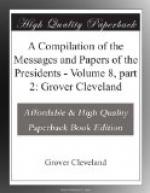The second clause, however, in its reprobation of “any other than an entirely voluntary emigration” by both the high contracting parties, and in the reciprocal obligations whereby we secured the solemn and unqualified engagement on the part of the Government of China “to pass laws making it a penal offense for a citizen of the United States or Chinese subjects to take Chinese subjects either to the United States or to any other foreign country without their free and voluntary consent,” constitutes the great force and value of this article. Its importance both in principle and in its practical service toward our protection against servile importation in the guise of immigration can not be overestimated. It commits the Chinese Government to active and efficient measures to suppress this iniquitous system, where those measures are most necessary and can be most effectual. It gives to this Government the footing of a treaty right to such measures and the means and opportunity of insisting upon their adoption and of complaint and resentment at their neglect. The fifth article, therefore, if it fall short of what the pressure of the later experience of our Pacific States may urge upon the attention of this Government as essential to the public welfare, seems to be in the right direction and to contain important advantages which once relinquished can not be easily recovered.
The second topic which interested the two Governments under the actual condition of things which prompted the Burlingame treaty was adequate protection, under the solemn and definite guaranties of a treaty, of the Chinese already in this country and those who should seek our shores. This was the object, and forms the subject of the sixth article, by whose reciprocal engagement the citizens and subjects of the two Governments, respectively, visiting or residing in the country of the other are secured the same privileges, immunities, or exemptions there enjoyed by the citizens or subjects of the most favored nations. The treaty of 1858, to which these articles are made supplemental, provides for a great amount of privilege and protection, both




